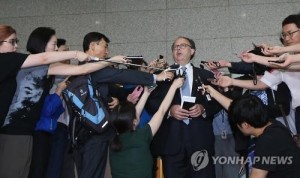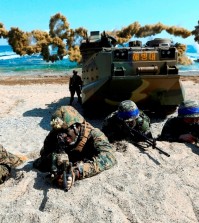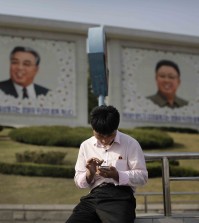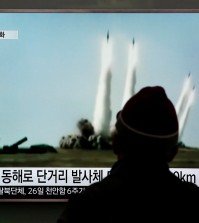- California Assembly OKs highest minimum wage in nation
- S. Korea unveils first graphic cigarette warnings
- US joins with South Korea, Japan in bid to deter North Korea
- LPGA golfer Chun In-gee finally back in action
- S. Korea won’t be top seed in final World Cup qualification round
- US men’s soccer misses 2nd straight Olympics
- US back on track in qualifying with 4-0 win over Guatemala
- High-intensity workout injuries spawn cottage industry
- CDC expands range of Zika mosquitoes into parts of Northeast
- Who knew? ‘The Walking Dead’ is helping families connect
Iran deal indicates US flexibility on N. Korea: Seiler

Sydney Seiler, the U.S. special envoy for the six-party talks, speaks to reporters in Seoul on July 27, 2015, after meetings with South Korean officials. (Yonhap)
SEOUL, July 27 (Yonhap) — The United States is willing to show flexibility in nuclear talks with North Korea, if resumed, as demonstrated in a recent deal with Iran, a key Washington official on Pyongyang said Monday.
“We have long been open to dialogue with the DPRK and we have made quite clear to the DPRK that we are willing to engage in discussions on a range of issues,” Sydney Seiler, the U.S. special envoy for the six-party talks, told reporters here. The DPRK is the acronym for the North’s official name, the Democratic People’s Republic of Korea.
After meetings with South Korean nuclear envoys, Seiler stressed that the North needs to learn some lessons from the progress in the U.S.-led efforts to curb Iran’s uranium enrichment program.
It “provides an excellent example of the U.S.’ flexibility and willingness to engage with countries with whom we had longstanding differences,” he said.
Seiler described his trip to Seoul as part of “ongoing efforts to seek a way back to authentic and credible negotiations (with North Korea) leading to the denuclearization of the Korean Peninsula.”
With no other realistic alternative in sight, the U.S. and its partners are still committed to the six-party talks that were last held in late 2008. The other members are China, Japan and Russia.
Asked again if the Iran case provides fresh momentum for dealing with North Korea, Seiler emphasized it’s up to North Korea’s leadership.
He said the Obama administration will stick to its “constant” two-way approach, seeking negotiations with the North and pressuring it.
On the first leg of his weeklong Northeast Asia tour, he held talks with Kim Gunn, director general for North Korean nuclear affairs at South Korea’s Foreign Ministry. He also paid a courtesy call on South Korea’s top nuclear negotiator Hwang Joon-kook.
Seiler noted the timing of his discussions with South Koreans.
On Monday, the two Koreas marked the anniversary of the 1953 Armistice Day agreement that effectively ended the three-year Korean War.
South Korea and the U.S. have maintained a close alliance to ensure peace and stability on the peninsula, he said.
Seiler plans to head to Beijing on Tuesday for meetings with Chinese officials, including his new counterpart Deputy Representative for Korean Peninsula Affairs Xiao Qian.
He stressed the importance of Beijing’s role, citing its “unique relationship” with Pyongyang. China hosts the six-party talks that produced the landmark Sept. 19 aid-for-denuclearization agreement a decade ago.
China has been a close partner of the U.S. in negotiating the Iran deal as well, Seiler said.
“We will continue to explore the lessons learned as it were from our experience in negotiations on the Iran deal and see what we can do to apply those lessons to bring the DPRK to the negotiating table,” he said.
He will fly to Tokyo the following day, where he will hold a trilateral session with Kim Gunn of South Korea and Shigeki Takizaki, deputy head of Japan’s delegation to the six-party talks.















